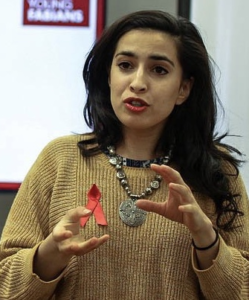The political upheavals of 2016 pose a serious threat to the progress we have made in improving women’s health and reproductive rights
 Over the past few decades we have made great progress around the world in improving women’s health and reproductive rights—with increased access to family planning, sexual health, and improved cervical cancer service provision. Since 1990, maternal mortality has almost halved—from about 532 000 deaths in 1990 to an estimated 303 000 in 2015.
Over the past few decades we have made great progress around the world in improving women’s health and reproductive rights—with increased access to family planning, sexual health, and improved cervical cancer service provision. Since 1990, maternal mortality has almost halved—from about 532 000 deaths in 1990 to an estimated 303 000 in 2015.
Yet today, on International Women’s Day, global health and women’s rights organisations across the globe are voicing grave concerns that the political upheavals of 2016 pose a serious threat to the progress we have made.
In recent months, the world’s media has been transfixed by new US president Donald Trump. Having stated during his election campaign that women who have abortions should face “some form of punishment,” he has threatened to pull federal funding for Planned Parenthood—a charity that provides free or subsidised family planning services to people on low incomes. As federal funding contributes to 40% of the charity’s income, such a move would undoubtedly result in restrictions to the services it can provide and clinic closures.
Trump has ratified his campaign rhetoric with his choice of appointment for vice president: governor Mike Pence, who once stated that condoms are ‘“too modern” and “very, very poor protection against sexually transmitted diseases.” Last year Pence backed an anti-abortion law in Indiana that, among other punitive measures, made it a requirement for a woman to view her fetal ultrasound before being allowed to have an abortion.
Sadly, the policies of this new administration will have ramifications across the developing world. On his first day in office, Trump reinstated and expanded the “global gag” rule. This means that any foreign health agency that advises, performs, or advocates for abortions will lose their US funding (even if the abortions are not being directly financed by US government money). The repercussions of this are broad and severe.
The US is the single biggest funder of global health programmes; consequently, this law will block critical funding for health services including family planning, maternal health, and HIV/AIDS prevention and treatment. The policy also damages the doctor-patient relationship by restricting the medical information that healthcare providers can discuss. Marie Stopes, an international provider of reproductive health services, estimates that without alternative funding, the impact of this law on their services could result in 2.1 million unsafe abortions and over 20 000 maternal deaths during Trump’s first term as president.
This worrying anti-abortion rhetoric can also be heard in the changing political landscape of Europe. In October there were protests in Poland (a country that already has extremely restrictive abortions laws) against a bill that made any abortion (including pregnancy as a result of rape) an imprisonable offence for the woman having an abortion and the doctor performing it. Lawmakers abandoned that bill, but new proposals are planned.
In France, the far right populist party the National Front has spoken of restricting abortion rights and cutting funding to the French equivalent of Planned Parenthood. Meanwhile, the Alternative for Germany Party talk about returning to “traditional family values” and wanting “more German births” to solve the “demographic crisis.” And today there are protests in Northern Ireland as women there still risk prosecution if they choose to have an abortion.
Data from the World Health Organization show that restrictive abortion laws do not reduce abortion rates; rather, the reduced access to contraception and safe abortion services leads to increased numbers of unintended pregnancies and, ultimately, more deaths from unsafe abortions. Lucy Jones, Doctors of the World’s UK programme manager, says that “Unsafe abortions cause the death of around 50 000 women a year. Eight million more suffer temporary or definitive disabilities.”
The progress we have made for women’s health and their reproductive rights is jeopardised by this tide of political change. The international medical community has a duty to take a stand; to protect women’s reproductive rights and address the immediate funding shortfalls. Every two minutes a woman or girl dies as a result of pregnancy. By staying silent, we risk the lives of women and girls across the globe.
Sonia Adesara is a trust grade doctor at Dean Street sexual health clinic; co-chair of the Young Medical Women International Association; and chair of the Young Fabian Health Network, a political thinktank. She is on Twitter @SoniaAdesara
Competing interests: I have read and understood BMJ policy on declaration of interests and declare the following interests: None.
